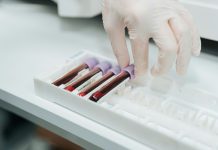
In a study from the University of Maryland, scientists found despite evidence that starting two blood-thinning medications shortly after a minor stroke or a warning stroke (transient ischemic attack—TIA) may prevent a second—possibly more serious—clot-caused stroke within a few months, the treatment regimen is underused especially among women.
Blood thinners, such as aspirin and clopidogrel, prevent platelets from sticking together and forming blood clots.
Prescribing two anti-platelet medications at the same time is known as dual antiplatelet therapy (DAPT).
In recent research, DAPT has been shown to reduce the short-term risk of another stroke in people with a recent minor stroke (mild, non-disabling symptoms) or with a TIA.
As with most strokes, a TIA is caused by a clot temporarily blocking blood flow to the brain, however, TIA symptoms usually only last a few minutes and result in no permanent brain injury or physical disability.
In the study, the team reviewed the electronic health records of 2,953 adults admitted to one of the hospitals of the University of Maryland Stroke Clinical Network.
All were treated for minor strokes or TIA between 2018 and 2021. None were taking blood thinning medication such as warfarin or apixaban before the stroke or TIA.
The participants were of an average age of 67 years; 42% were age 70 or older; 48% were women, 37% were Black adults, and 60% white adults.
The team found DAPT was underutilized across all hospitals reviewed, and prescribed to just 40% of the overall patients.
Men were more likely than women (43% vs. 37%, respectively) to be prescribed DAPT.
The percentage of patients receiving DAPT did not differ significantly by race, age, or whether the person was treated at a stroke center that delivers specialized stroke care.
The team says there are an increasing number of options available to prevent and reduce the risk of a recurrent stroke, including high blood pressure medications, statins to control cholesterol, and dual blood thinners.
Patients and their family members should inquire about the use of DAPT after a stroke or TIA to consider if DAPT may be beneficial.
If you care about stroke, please read studies that background noise may increase your risk of stroke, and common pain relief drugs may increase the risks of heart disease and stroke.
For more information about nutrition, please see recent studies about the key to better stroke outcomes, and tea and coffee may help lower your risk of stroke and dementia.
The study was conducted by Jonathan Solomonow et al and presented at the American Stroke Association’s International Stroke Conference 2023.
Copyright © 2023 Knowridge Science Report. All rights reserved.



